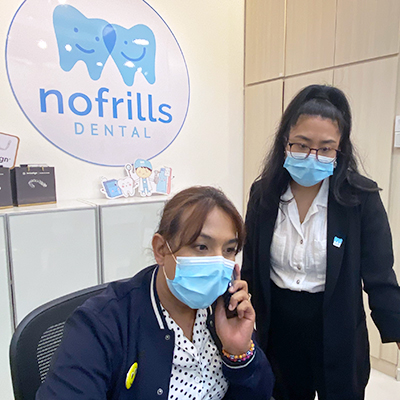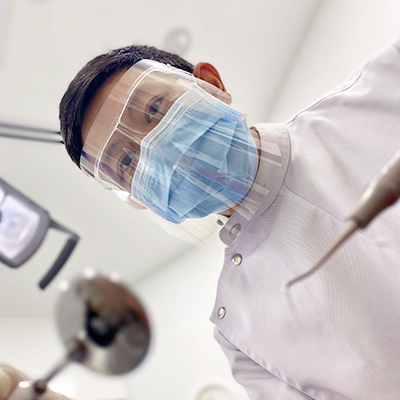Gum Disease & Treatment
Gum disease is an inflammatory disease caused by accumulation of bacteria (also known as dental plaque) above and below the gum line. Signs of gum disease are red, swollen or bleeding gums; bad breath; gum recession; pain and discomfort in teeth, gums or soft tissues of the mouth; and loosening of teeth over time.
Gum surgery is recommended to correct moderate to severe forms of gum disease. This is to allow our dentist to gain direct access to hardened tartar deposits around the roots of your teeth that lies deep below the gum line, reshape the supporting bone and reduce the depth of gum pockets.
Gum Treatment
Gum treatment may involve the following procedures:
- Scaling and root planing is a deep-cleaning, non-surgical procedure, done under local anaesthetic, whereby plaque and tartar from above and below the gum line are removed and rough spots on teeth roots are made smooth. Smoothening rough spots removes bacteria and provides a clean surface for the gums to re-attach to the teeth. After the procedure, you may feel some discomfort for up to 48 hours.
- Gum (Periodontal) surgery is recommended when there is a significant separation between the gum and the teeth. In this procedure, the gums are carefully reflected aside to reveal the true extent of infected calculus. In some cases, the shape of the bone around the infected teeth is shaped to speed up healing. In other cases, the bone and gum tissues can be re-created.
- Gum and bone grafting may be performed to repair damaged gums and jawbone when the gums around the teeth have receded. Bone grafting can enhance areas of deficient bone to facilitate dental implant placement.
Benefits of Gum Surgery
Having gum surgery enhances healing of the supporting gum and bone around the affected teeth so that patients can continue to keep and use them. It will also make it easier for patients to maintain a healthy and functional dentition.
Treatment Process
Our dentist will numb the gums by administering a local anaesthetic. A small incision is made along the gum margin to enable the dentist to fold back the gums and expose the roots of the affected teeth. Our dentist will identify areas of hardened deposits that harbour bacteria removed from the root surface. The dentist will then proceed to smoothen and recontour the irregular surface of the damaged bony areas. The gums are then repositioned and held in place using stitches.
FAQs on Gum Surgery
1. How long will the procedure take?
The procedure time varies depending on the number and location of affected teeth. Average procedure time will take approximately 45 minutes.
2. Is the procedure painful?
The procedure is generally not painful as it is performed under local anaesthetics. Some patients may opt for sedation if they feel particularly worried about the surgery.
3. What happens after the surgery?
Following surgery, the surgical site may feel slightly tender, sore and swollen for up to weeks. Some patients may also experience more sensitivity to hot and cold during the initial healing period. You may be prescribed strong painkillers to relieve the discomfort, antibiotics to prevent infection and an antibacterial mouthwash to keep the mouth clean.
While most patients are able to resume their normal routines the day after the surgery, It is best to avoid chewing on hard food (e.g. ice and nuts), especially at the surgical site for the next few days. Smoking have been proven to interfere with healing. You are advised to work out a plan with your periodontist on how best to manage this habit to facilitate your quick recovery. Our dentist will review your progress, clean the surgical site and remove the stitches 7-10 days later.
4. How can I prevent gum disease?
Regular brushing, flossing twice daily and regular visits to the dentist for scaling and polishing twice a year is recommended. When gingivitis is present, a thorough scaling and root planning by the dentist followed by good oral care will keep the gum disease in check. If there are misaligned teeth or crowded front teeth, orthodontic treatment to correct the alignment can be helpful. Impacted wisdom teeth that do not enough room to erupt are also best removed early to minimize the occurrences of gum inflammation or tooth decay. Prevention is better than cure. By the time the supporting bone around the teeth is lost, extensive gum treatment by a periodontist will be needed.
Dental Services
Book an Appointment!

CHAS & Medisave Accredited Clinics
NoFrills Dental clinics in Singapore participate in Merdeka Generation, Pioneer Generation, CHAS Card and Medisave programs.

Flexible Payment Options Available
Contact us to know more about the versatile & flexible payment options offered at NoFrills Dental clinics.

Opening Hours
Monday - Friday: 10am to 7pm
Saturday: 10am to 5pm
Sunday & Public Holiday: Closed

Book an Appointment
NoFrills Dental offers a wide variety of high-quality dental services. Talk to us to book your next dental appointment with us.

